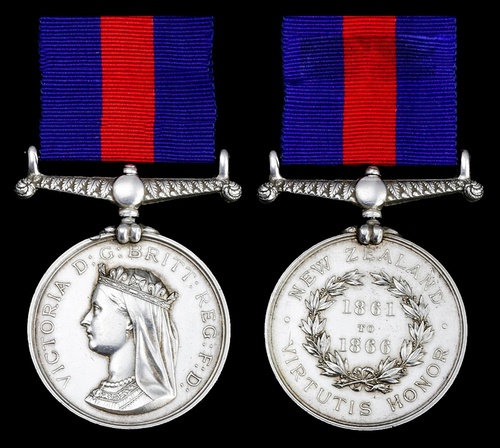
Auction: 18001 - Orders, Decorations and Medals
Lot: 99
(x) Family group:
The New Zealand Medal awarded to Captain H. Goldsmith, Waikato Militia, a gallivanting commander who was frequently under fire and on one occasion had his horse shot under him
New Zealand 1845-66, reverse dated 1861-66 (Captn. H. G. Smith. 1st. Waikato Mila.), officially impressed naming, note surname, minor neat solder repair to left side of claw, good very fine and rare
The British War Medal awarded to Gunner H. D. Goldsmith, New Zealand Expeditionary Force, grandson of Captain H. Goldsmith
British War Medal 1914-20 (79900 Gnr. H. D. Gold-Smith N.Z.E.F.), nearly extremely fine (2)
Henry Goldsmith had previously served in the Victorian Volunteer Engineers and listed his profession as 'soldier' when enlisting in the New Zealand Militia at Melbourne on 1 September 1863. Immediately commissioned, the 1st Battalion departed on 12 September and were soon in action, attached to the Imperial Commissariat Transport Corps.
At Mauku on 23 October 1863, Lieutenant John Perceval of the 1st Battalion led a force against Maoris who had been spotted shooting cattle in the valley between Bald Hills and Titi Hill. Pressing into the valley, the small detachment of 13 men accounted for 30 Maoris before being rushed and overpowered. An early morning reconnaissance the following day found Perceval and six of his men stripped and laid out in a row: they had all been tomahawked and a white haversack on a stick had been erected to mark their location.
Goldsmith later served under General Cameron and came under fire during the raid on Rangiaowhia, 21 February 1864 and at the battle of Orakau, 31 March-2 April 1864. The battle witnessed the final stand of Rewi Maniapoto and around 200 of his warriors - together with an estimated 100 women and children - and took place in their redoubt formed in a peach grove. Colonial advances and attacks were bravely beaten off by the warriors who held their nerve, only opening fire when the troops had closed to around 100 feet. The desperate defenders were soon running low on supplies, ammunition and reinforcements had no chance of breaking through. Despite being offered the chance to surrender, the Maoris gave their now infamous reply:
'E hoa, ka whawhai tonu matou, Ake! Ake! Ake!'
[Friend, we will fight on forever, forever and forever!]
At 3.30 p.m. on 2 April, the majority of the defenders escaped the redoubt and took the Colonials by surprise. The Maoris then split into smaller groups and attempted to scarper into the countryside, quickly pursued by cavalry and Forest Rangers. An estimated 160 were killed, with the Colonials taking 67 casualties. For his own part, Goldsmith had his 'horse shot in the shoulder' (his Medal application, refers); the whole event was later immortalised in Hayward's 1925 film 'Rewi's Last Stand'.
Goldsmith later commanded an attack upon Irihanga whilst commanding Omanawa in January 1867, in which action Sergeant-Major Emus was mortally wounded. Goldsmith's Medal was issued in 1871; sold together with copied research and correspondence.
Subject to 5% tax on Hammer Price in addition to 20% VAT on Buyer’s Premium. For more information please view Terms and Conditions for Buyers.
Sold for
£800




